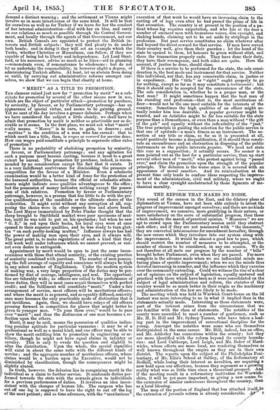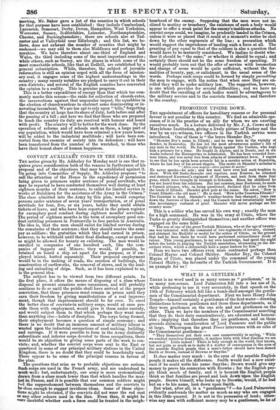THE REFORM THAT MAKES NO NOISE.
TEE sound of the cannon in the East, and the dilatory pleas of diplomatists at Vienna, have not been able entirely to arrest the progress of improvement amongst ourselves; and there are no kinds of improvement, we conceive, more gratifying in their nature, or more satisfactory on the score of substantial progress, than those which indicate the march of practical opinion. Measures " we are apt to crowd upon the Parliamentary session until they obstruct each other; and if they are not massacred with "the innocents," they are converted into occasions for amendment hereafter, through the new errors which they introduce into our system along with the improvement. It would be almost a good law to pass, which should restrict the number of measures to be attempted, or the number of clauses to be considered, in any one session. We do not therefore at all mete our progress by the number of "
brought before Parliament, even when they are passed. Far more complete is the advance made when we see influential minds ma- turing plans of specific improvement; when we see the minds thus devoted increasing in number, and the influence which they exercise over the community extending. Could we witness the rise of a clear set of opinions on the subject of legislation, equally matured and practical with those which have been as it were consolidated on the subject of legal administration and reform, the statutes of this country would be as much better in their origin as the machinery and administration of the law are likely to be made.
The meeting which was held in Warwick Court-house on the 3d instant was more interesting to us in what it implied than in the statements actually made. Interesting as those statements were, part of the interest arises from the circumstance that we are familiar with the class of statements. The notables of the county were assembled to meet a number of gentlemen, such as Mr. M. D. Hill and Mr. Sydney Turner, who have taken a lead- ing part in the improvement of correctional discipline for the young. Amongst the notables were some who are themselves distinguished in the same career. Mr. Hill, indeed, has an office, and Mr. Adderley has connexions within the county ; but they are more identified with the reform beyond its county bounda- ries : and Lord Calthorpe, Lord Leigh, and Mr. Baker of Hard- wicke, whose efforts are more local, are rendering themselves as well known throughout the empire as they are in their own district. The reports upon the subject of the Philadelphia Peni- tentiary, of Mr. Ellis's School at Saltley, of the Reformatory at Redhill, while losing their interest as novelties, are acquiring a new hold upon our affections, because they represent as a growing reality what was so little time since a theoretical prospect. And if the meeting result in a reformatory institution for Warwick- shire, it will be yet more important, as giving a new centre for. the extension of similar endeavours throughout the country, than as a local blessing.
The map of the portion of England that has attached it the extension of juvenile reform is already considerable. meeting, Mr. Baker gave a list of the counties in which schools
for that p have been established : they include Cumberland, Lancaster, Cerset, Derby, Devon, Hampshire, West Yorkshire, Worcester, Sussex, Bedfordshire, Leioester, Northamptonshire, Chester, and Buckinghamshire ; there are schools also at Tad- caster and at Valleyfield near Edinburgh ; and this list, we be- lieve, does not exhaust the number of counties that might be reckoned—we may add to them also Middlesex and perhaps Rad- norshire. We have therefore about one-third of England and Wales, the third including some of the most important counties while others, such as Surrey, are the places in which some of the most remarkable schools, like that at Redhill, are established by a general subscription. While, therefore, the subject of juvenile reformation is still an opinion urged with all the force of mission- ary zeal, it engages some of the highest understandings in the country ; many county notables are pledged to oarry it out in their own districts; and several of the English counties have converted the opinion to a reality. This is genuine progress. This is a better expenditure of energy than that which too com- monly marks this season—the raids for collection of church-rates, the insurrections against that unpopular impost, the squabbles in the election of churchwardens to obstruct some domineering or in- novating incumbent. We are too apt to rely upon " bills," forgetting that the country at large has its share of ditty, both before and after the passing of a bill ; and here we find that those who are prepared to teach the country its duty are received with honour and heard with profit. The country will be better for the work done. By the operation of reforms and of schools such as these, a large part of our population, which would have been criminal a few years hence, will be added to the industrial multitude • will have been con- verted from the enemies of society into its defenders ; will have been transferred from the number of the wretched, to those who have their honest share of human happiness.



























 Previous page
Previous page